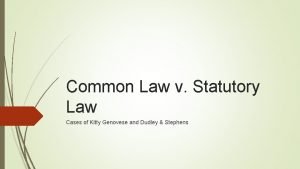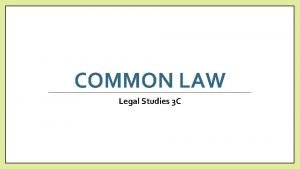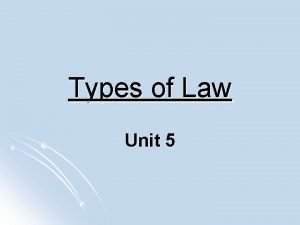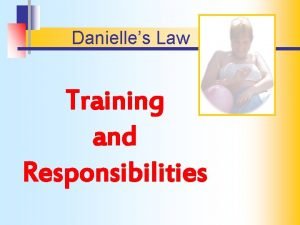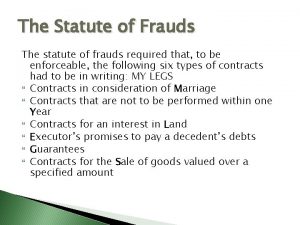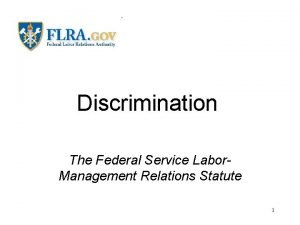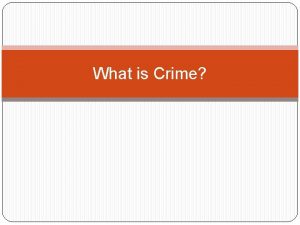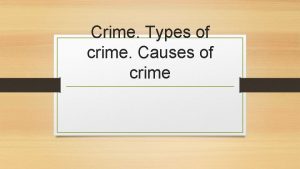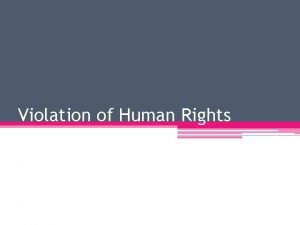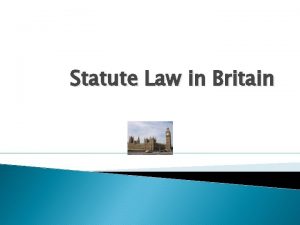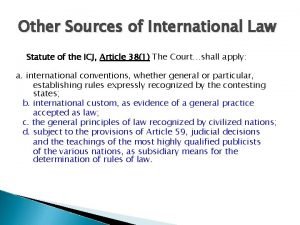Crime Law Crime a violation of a statute












- Slides: 12

Crime & Law

• Crime: a violation of a statute in which there is a concurrence of criminal intent and a criminal act • With exceptions, every crime has THREE (3) elements • Law: a system of rules enacted by a country to regulate how it’s institutions and citizens act Definitions

• • • Criminal Act Criminal Intent Concurrence Causation Harm Attendant Circumstances Elements of Crime

• Most crimes must have at least three elements: criminal act, criminal intent, and concurrence of the two. • Ex: Sarah and Evan get in a fight. As a result, Sarah runs to her car, starts the engine, and tries to run Evan over. He manages to get out of the way, and as a result, Evan is not hurt. Sarah is still charged with attempted assault/murder. • Identify criminal act, intent, and concurrence in the above scenario. Elements of Crime cont.

• Criminal intent, or mens rea, is a necessary component of most crimes. • If someone gets in an accident that results in a death, they cannot necessarily be charged with murder, but they could be charged with reckless driving or involuntary manslaughter depending on the details of the incident. Criminal Intent

• Intent without action CANNOT BE CHARGED! • Thoughts are non-criminal unless they are followed up by criminal action. • Example: Mercedes is a housekeeper for Kelly, a wealthy woman with a lot of fancy jewelry. Mercedes fantasizes about rigging the gas line so that gas leaks into the house, killing Kelly in her sleep. She even writes down her plan with a date to enact it in her diary. When Mercedes leaves the house one day, her diary falls out of her bag, and Kelly finds it. She calls the police. • Can Mercedes be charged? What about thoughts?

• Criminal Act – also known as actus reus – can be defined as any “unlawful bodily movement”. • Voluntariness is REQUIRED for criminal act to take place • Typically, there can be no crime without criminal act • Exceptions include possession and omission Criminal Act

• Ethan is hypnotized at a county fair. While under the influence of hypnosis, the hypnotist suggests that Ethan smash a banana cream pie in his girlfriend’s face. While in most cases, this would be considered battery (if reported), Ethan would not be charged. • Why? • What is the purpose of being charged and punished? Voluntariness – An Example

• While involuntary acts cannot be charged, if they are preceded by an act that is voluntary, they can be. • Example: Drunk driving • Compare effectiveness of punishment between this scenario and the scenario on the previous slide. Voluntary Act Followed by a Non-Voluntary Act

• Possession: possession is passive, so it cannot be considered an act, but people can still be charged for being in possession of an illegal substance/object • Must be knowing • Omission to Act: if a person has a statutory or contractual obligation to act when a criminal act is taking place, they MUST, or risk facing charges of omission. Exceptions to Action

• Infraction – violation or infringement of a law or regulation • Usually punishable by a fine. In most states, these are not criminal offenses and are not punishable by incarceration. • Misdemeanor – a minor crime punishable with incarceration of one year or less • Public intoxication, prostitution, reckless driving, petty theft • Felony – a major crime, usually violent, punishable by more than one year in prison and/or death • Murder, grand theft, arson Types of Crime

• Major Crime - a crime that is committed such as murder, rape, sexual molestation, robbery, aggravated assault, burglary, motor vehicle or larceny theft, and/or any crime committed against the state; to include terrorism. • Mala in se – sinful or inherently wrong by nature, independent from regulations • Rape, murder, robbery, assault, & battery – universally wrong • Mala prohibita – conduct that is wrong/punishable because it is prohibited by statute • Drug abuse, drunk driving, gambling, public intoxication, parking in a handicap zone – determined by state Major Crime - Terminology
 Difference between common law and statute law
Difference between common law and statute law Doctrine of precedent
Doctrine of precedent Statute law examples
Statute law examples Danielles law
Danielles law The statute of westminster
The statute of westminster My legs statute of frauds
My legs statute of frauds Federal service labor-management relations statute
Federal service labor-management relations statute Company statute
Company statute Florida board member certification course
Florida board member certification course Alabama dui statute
Alabama dui statute Federal service labor management relations statute
Federal service labor management relations statute Statute of frauds my legs
Statute of frauds my legs Florida statute 252
Florida statute 252
